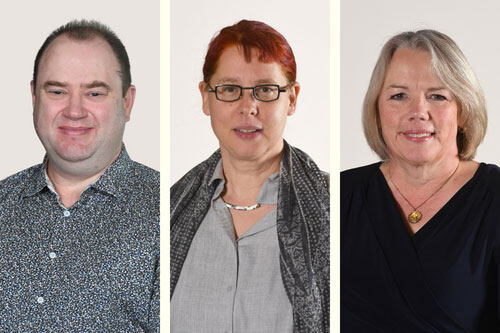The University of Waikato has announced its latest round of academic promotions.


Three academics have been promoted to Professor and seven to Associate Professor.
Academic promotions recognise outstanding contributions to research, teaching, student supervision and leadership within the University as well as the achievement of an international reputation in each academic’s area of specialisation.
Promotion to Professor
Professor Michael Cameron, Te Raupapa, Waikato Management School
Professor Cameron teaches both of the University’s introductory economics papers, while his research interests cover a broad range of population, health and development issues, as well as economics education.
Professor Annika Hinze, Te Kura Rorohiko me ngā Pūtaiao Pāngarau, School of Computing and Mathematical Sciences
Professor Hinze’s research interests include location and event-based system and digital libraries and often involves cross-disciplinary contexts, involving colleagues and industry partners from science, geography, education, and Māori and Indigenous studies. She strongly believes in the benefits of collaboration, coaching and mentoring, and is enthusiastic about technology for good.
Professor Sally Peters, Te Kura Toi Tangata, School of Education
As a researcher, Professor Peters’ main areas of interest relate to children’s learning and development. One central research focus has been on transitions, especially from early childhood education to school. Professor Peters has also grown increasingly interested in transitions across different aspects of the lifespan and transitions in thinking. Much of her work is carried out in partnership with teachers and has direct implications for practice.
Promotion to Associate Professor
Dr Donna Campbell, Te Pua Wānanga ki te Ao, Faculty of Māori and Indigenous Studies
Dr Campbell (Ngāpuhi, Ngāti Ruanui) is a practising artist and teacher, and creative practice researcher. Her research areas are arts-based practice exploring embodied Indigenous knowledge in Māori textile arts, Māori creative practice as sites of contestation, and kaupapa Māori research methodologies. Her creative work is held in international and national collections. Along with curating numerous exhibitions of weaving and textile artworks, she is a passionate advocate of rongoā toi Māori.
Dr Cheryl Cockburn-Wootten, Te Raupapa, Waikato Management School
Dr Cockburn-Wootten is a critical management communication scholar examining issues facing society, specifically focusing on disability communities, not-for-profit organisations and refugee and migrant background communities. As a teacher, her pedagogy facilitates a sense of voice, belonging, and involvement through concrete and creative activities that amplify students’ abilities and knowledge.
Dr Joanne Ellis, Te Aka Mātuatua, School of Science
Dr Ellis is a marine ecologist whose research focuses on the interaction effects of multiple stressors on benthic communities. She has led pioneering advances in understanding how human drivers of environmental change, including coastal intensification and climate change, impact the functioning and structure of marine ecosystems.
Dr Olli Hellmann, Te Kura Aronui, School of Social Sciences
Dr Hellmann teaches a number of papers on politics and international relations at the University’s Tauranga campus and specialises in political communication, with a particular focus on the role of media in constructing collective memories of the historical past and the power of visual images in shaping popular understandings of political issues.
Dr Charles Lee, Te Aka Mātuatua, School of Science
Dr Lee is an environmental scientist with extensive experience in extreme ecosystems, including Antarctica and geothermal habitats, and particular expertise in molecular genetic and genomic techniques. He has leadership roles within the Antarctic Science Platform and Te Tumu Whakaora Taiao – Environmental Research Institute.
Dr Marie Magnusson, Te Aka Mātuatua, School of Science
Dr Magnusson’s expertise as a phycologist covers algal production, algal biotechnology and the development of algal bioproducts. She leads a multidisciplinary research group delivering fundamental and applied science to underpin the development of a sustainable seaweed aquaculture industry in New Zealand. In this role she has a strong focus on industry engagement, research supervision, commercial outcomes, and communication and outreach.
Dr Waikaremoana Waitoki, Te Pua Wānanga ki te Ao, Faculty of Māori and Indigenous Studies
Dr Waitoki (Ngāti Hako, Ngāti Mahanga) researches mātauranga Māori as a distinct psychology. In this area she is active in seeking to decolonise national and international psychology. Her previous research aligned to strengthening cultural identity and mental and social wellbeing for Māori and their whānau and exploring language reclamation. She is the Science Lead on the MBIE Endeavour Fund research grant Working to End Racial Oppression (WERO) and Lead Investigator on a Marsden project on Indigenous Psychology.






































